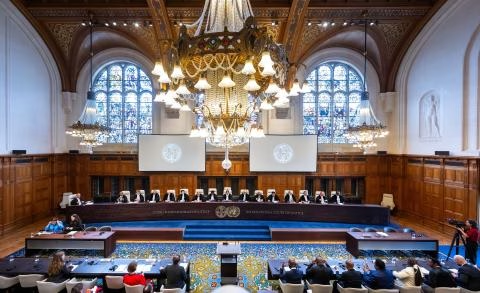South Africa has reaffirmed its determination to pursue legal action against Israel at the International Court of Justice (ICJ), with Foreign Minister Ronald Lamola insisting that the matter concerns not only the survival of the Palestinian people but also the fair and equal enforcement of international law.
Speaking before a joint sitting of the Portfolio Committees on International Relations and Justice in Parliament, Lamola underscored Pretoria’s belief that its actions are guided by international obligations and a moral duty to uphold global human rights standards.
“South Africa instituted proceedings before the ICJ to preserve the existence of the Palestinian people as a group and to end all acts of apartheid and genocide against them,”
he said.
International Law and Global Responsibility
The minister emphasised that South Africa’s case was never meant to be limited in scope.
“This is not only about Gaza and Israel — it is about reinforcing the global application of international humanitarian law in all conflict zones.”
Lamola argued that inaction in such cases has ripple effects far beyond the Middle East. If global institutions fail to act decisively, he suggested, the integrity of international law itself comes into question.
“Inaction has a direct impact on how international law is applied across the globe in all conflicts that affect people,”
he explained.
“Our actions resonate with the global majority — civil society, legal scholars, and analysts from both Israel and Palestine.”
Regional Tensions Escalate
Lamola’s comments came at a moment of mounting tension in the Middle East. Israel’s recent military strike on Qatari territory — an operation it said targeted Hamas-linked facilities — has deepened international unease. Doha strongly condemned the attack, calling it a breach of sovereignty and international law.
The incident has added further strain to attempts at negotiating a ceasefire, raising fears that fragile diplomatic efforts could collapse entirely.
Diplomatic Engagements Beyond The Courtroom
South Africa has also intensified its diplomatic outreach. Recently, Pretoria co-chaired a meeting of The Hague Group in Bogotá, alongside Colombia, where representatives of 30 nations convened to coordinate strategies supporting Palestinian self-determination and an end to Israel’s occupation.
Lamola pointed out that this initiative, together with the Madrid Group, is working towards securing an immediate ceasefire and laying the groundwork for a sustainable peace.
The Call for a Two-State Solution
Reiterating Pretoria’s long-standing position, Lamola urged concrete steps to remove barriers to peace. These include the declaration of a permanent ceasefire, the resumption of direct negotiations, the release of hostages held by Hamas as well as political prisoners held by Israel, a halt to settlement expansion, and the dismantling of occupied territories.
“South Africa will continue to act within global institutions to protect the right to life — whether in Gaza, Sudan, the DRC, or anywhere in the world,”
Lamola stated.
“We remain committed to promoting accountability, justice, and peace.”
The foreign minister insisted that Pretoria’s campaign is not symbolic but part of a larger effort to strengthen mechanisms of accountability for state-led violence. For South Africa, the outcome at the ICJ could set a precedent with implications far beyond the Israel-Palestine conflict.

















